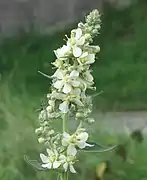Verbascum lychnitis
Verbascum lychnitis, the white mullein, is a flowering plant in the figwort family (Scrophulariaceae) native to Asia and Europe.[1][2] It has naturalized in parts of North America.[3][2] The species was first formally named by Carl Linnaeus in 1753.[4] Despite its common name, the flowers can be white or yellow.[5]
| Verbascum lychnitis | |
|---|---|
_2.jpg.webp) | |
| In Russia | |
| Scientific classification | |
| Kingdom: | Plantae |
| Clade: | Tracheophytes |
| Clade: | Angiosperms |
| Clade: | Eudicots |
| Clade: | Asterids |
| Order: | Lamiales |
| Family: | Scrophulariaceae |
| Genus: | Verbascum |
| Species: | V. lychnitis |
| Binomial name | |
| Verbascum lychnitis L. | |
| Synonyms[1] | |
|
List
| |
It is a biennial or short-lived perennial commonly found in disturbed areas.[6]
Verbascum lychnitis can be distinguished from other species in the genus Verbascum by the sessile and non-clasping stem leaves with upper and lower surfaces differing in color; small, flowers that are separated (not as tightly bunched together as other mulleins); and the somewhat long flower stalks. [2][5] As with other Mulleins the leaves are clothed with dendritic hairs. In V. lychnitis, the hairs are very short, less than 0.2 mm, so as to appear stellate. The lower surface is much hairier than the upper. [7]
It hybridizes with other mullein species [6], including V.nigrum, V.pulverentum and V.thapsus. [8]
 In Germany
In Germany
References
- "Verbascum lychnitis L." Plants of the World Online. Royal Botanic Gardens, Kew. Retrieved 5 September 2021.
- "Verbascum lychnitis". floranorthamerica.org. Retrieved 5 September 2021.
- "Verbascum lychnitis". NYFA: New York Flora Atlas. Retrieved 5 September 2021.
- "Verbascum lychnitis L." International Plant Names Index. Royal Botanic Gardens, Kew, Harvard University Herbaria & Libraries, and Australian National Botanic Gardens. Retrieved 5 September 2021.
- "Verbascum". floranorthamerica.org. Retrieved 5 September 2021.
- "Verbascum lychnitis". Online Atlas of the British and Irish Flora. Retrieved 5 September 2021.
- Poland, John; Clement, Eric (2020). The Vegetative Key to the British Flora. John Poland. p. 283. ISBN 978-0-9560144-2-9.
- Cullen, James; Murrell, Gina (2009). Flora of Great Britain and Ireland: Volume 3 Mimosaceae - Lentibulariaceae. Cambridge University Press. p. 448. ISBN 978-0-521-55337-7.
Additional Bibliography
- Cullen, James (2011). "Verbascum". In James Cullen; Sabina Knees (eds.). Boraginaceae to Compositae. European Garden Flora. Vol. V (2 ed.). Cambridge University Press. p. 180. ISBN 978-0-521-76164-2.
- T.G.Tutin; V. H. Heywood; N. A. Burges; D. M. Moore; D. H. Valentine; S. M. Walters; D. A. Webb, eds. (1972). "Verbascum". Diapensiaceae to Myoporaceae. Flora Europea. Vol. 3 (1 ed.). Cambridge University Press. ISBN 978-0-521-08489-5.
- Ellenberg, Heinz; Leutscher, Christoph (2010). Vegetation Mitteleuropas mit den Alpen (6 ed.). Ulmer Verlag UTB. p. 832. ISBN 978-3-8252-8104-5.
- Leslie, Alan (2019). Flora of Cambridgeshire. Peterborough, UK: Royal Horticultural Society. ISBN 978-1-907057-99-1.
- Prof. Dr.Eckehart J. Jaeger; Dr. Klaus Werner, eds. (2005). Gefasspflanze: Kritischer Band. Rothmaler: Exkursionsflora von Deutschland. Vol. 4 (10 ed.). Spektrum Verlag. p. 567. ISBN 3-8274-1496-2.